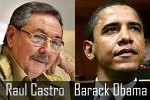
Let's get U S-Cuba relations straight
By Dr. Kwame Nantambu
April 11, 2009
The purpose of this article is to set the record straight in regard to the Cuban issue at the Fifth Summit of the Americas that is scheduled for April 17-19 in Trinidad.
Indeed, the record shows that Fidel Castro came to power through armed revolution on the 1st January 1959. He overthrew General Fulgencio Batista.
On 3rd January 1961, President Dwight Eisenhower severed diplomatic ties with Cuba.
On 17th April 1961, the United States conducted the ill-fated "Bay of Pigs" military invasion against Cuba.
On 1st May 1961, President Fidel Castro declared Cuba a "Socialist State".
On 7th February 1962, the United States imposed an economic/trade embargo against Cuba.
On 22nd October 1962, President John F. Kennedy imposed a "quarantine" and "blockade" against Cuba during the famous "Cuban Missile Crisis."
What this litany suggests is that Cuba is no longer a threat to the national security interests of the United States. Cuba is not America's 'enemy' today. There are no Soviet/KGB military personnel on Cuban soil and Cuba does not have any nuclear warheads aimed at America's Miami coast.
The fact of the matter is that current Cuban President Raul Castro is not pursuing a foreign policy objective under the rubric of "proletarian internationalism" whereby Cuba has over 75,000 military personnel in southern Africa fighting against European colonialism as then President Fidel Castro had during the dark days of the Cold War. Those days are gone.
Furthermore, during his presidential campaign, Senator Barack Obama constantly called for improved relations with Cuba based on specific political conditions that must exist in Cuba. Those conditions have not changed now that he has become President of the United States.
Quite recently, the Obama administration not only permitted Cuban-Americans to visit their families in Cuba but they are also able to send remittances to them.
The fact of the matter is that President Barack Obama is scheduled to attend the Fifth Summit of the Americas. The President is not attending the Fifth Summit on Cuba; ergo, Cuba should not be on the top of the agenda.
Hemispheric leaders need to understand that while military policy is a "one-shop" action, diplomacy is for the long haul. Ipso facto, any suggestion that Cuba should be the focal point at this Summit represents a misunderstanding and miscalculation on their part as to the modus operandi of America's foreign policy decision-making process.
The fact of the matter is that improved relations between Havana and Washington will only be achieved by means of direct, one-on-one talks/discussions between officials of both governments. It will never be achieved through discussions between third-party government leaders at any Summit or Conference. Diplomacy just does not work that way.
Let the record show that the Obama administration is seeking to improve relations with Tehran through direct, one-on-one talks between high government officials on both sides --- not via any Islamic Conference.
The Obama administration is also seeking to achieve the same through direct talks with the leadership of the Palestinians and the Afghanistan government. President Obama has appointed "special envoys" to achieve this goal.
Therefore, any improvement in US-Cuba relations must follow this same diplomatic model. Indeed, a forty-seven year-old US policy cannot and will not be changed at any Summit of the Americas. It will only be changed following the afore-mentioned diplomatic model. That's it. This is the principled position of the Obama administration and it is the correct geo-political decision.
Dr. Kwame Nantambu is a part-time lecturer at Cipriani College of labour and Co-operative Studies and University of the West Indies.
Share your views here...
Nantambu's Homepage | Archives | Trinicenter Homepage
